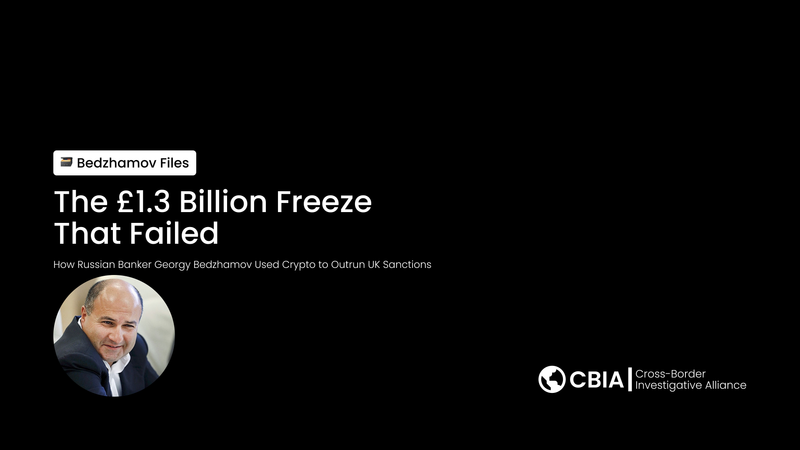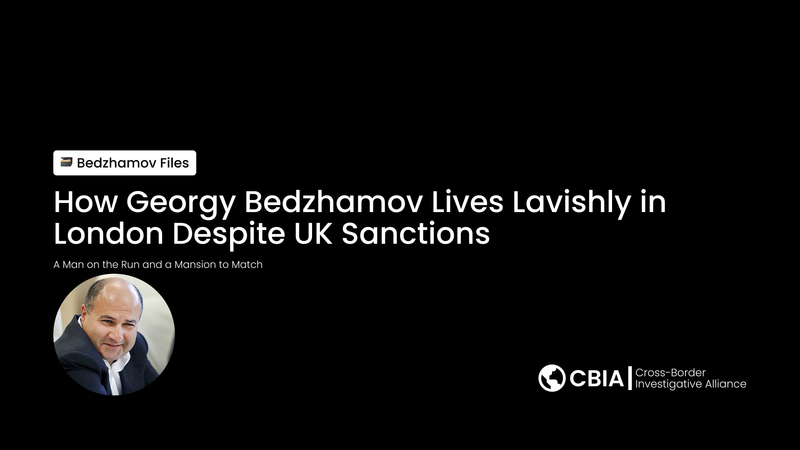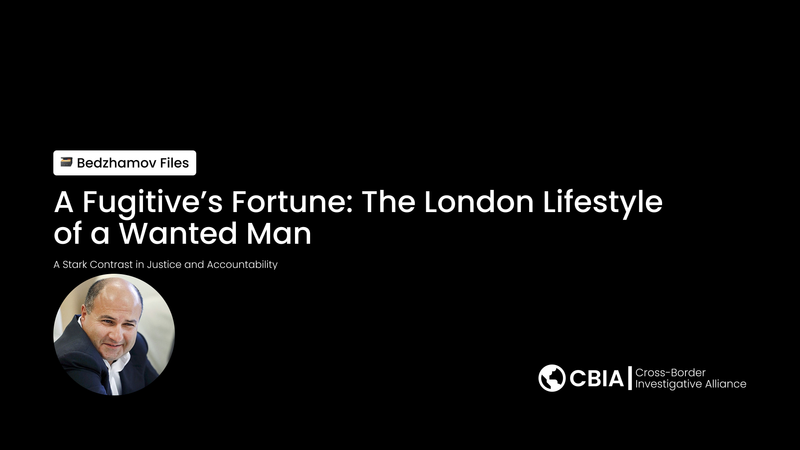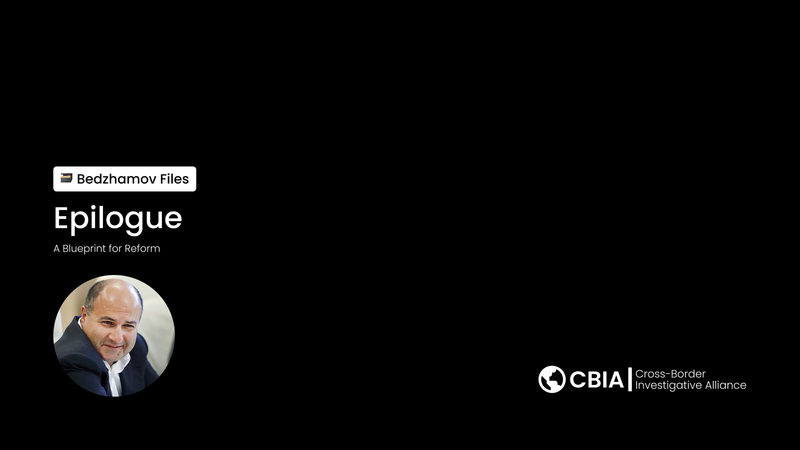Larisa Markus and the Vneshprombank Scandal

A Russian banking executive who embezzled 113.5 billion rubles (£1.4 billion) and fled to London while her brother evaded extradition from Monaco has exposed critical weaknesses in international efforts to tackle cross-border financial crime.
Larisa Markus, former president of Vneshprombank, was sentenced to eight and a half years in prison in 2017 for orchestrating one of Russia's largest banking frauds. But her brother Georgy Bedzhamov remains free in London despite multiple extradition requests, protected by a web of offshore companies and legal challenges that have frustrated investigators across three continents.
The case reveals how family criminal networks exploit jurisdictional gaps and legal protections to shield billions in stolen assets, with profound implications for international banking oversight and asset recovery efforts.
The Last-Minute Exodus
In December 2015, as Russian investigators closed in on Vneshprombank, Georgy Bedzhamov fled Moscow just days before his sister's arrest. The timing was no coincidence—the siblings had spent months moving embezzled funds through a sophisticated network of offshore entities designed to obscure their criminal proceeds.
Markus was arrested on December 8, 2015, charged with embezzling 113.5 billion rubles through fraudulent loans to shell companies that existed solely to funnel money offshore. Court documents reveal she orchestrated the scheme between 2011 and 2015, using her position as bank president to approve loans to entities with no legitimate business purpose.
"This was systematic theft on an industrial scale," said Roman Prokopchuk, a Moscow-based financial crime investigator familiar with the case. "Markus didn't just steal money—she hollowed out an entire bank while regulators looked the other way."
The fraud contributed to Vneshprombank's collapse in March 2016, leaving creditors with 218 billion rubles in losses according to Russia's Deposit Insurance Agency. Ordinary depositors lost savings while the Markus-Bedzhamov network had already moved their criminal proceeds beyond reach.
Monaco's Missed Opportunity
Bedzhamov's escape route led first to Monaco, where he was detained in April 2016 following a Russian extradition request. For three months, it appeared international cooperation might succeed in bringing him to justice.
But Monaco's Court of Appeal refused extradition in July 2016, citing Bedzhamov's claimed health problems rather than examining the strength of evidence against him. The decision allowed him to relocate to London, where he has remained despite continued legal pressure.
"Monaco's refusal to extradite Bedzhamov was a gift to international money launderers," said Graham Barrow, a UK-based financial crime expert. "It showed that with enough money and the right legal team, even clear-cut fraud cases can be frustrated by procedural objections."
The Monaco decision has had lasting consequences. Russian authorities estimate Bedzhamov coordinated the movement of hundreds of millions of dollars through shell companies in Cyprus, Liechtenstein, and other offshore jurisdictions, using the time bought by legal delays to further obscure asset trails.
The Pandora Papers Connection
The 2021 Pandora Papers revelations provided crucial insight into how the siblings concealed their criminal proceeds. Leaked documents from Cypriot law firm Demetrios A. Demetriades LLC revealed backdated contracts and ownership transfers designed to mislead investigators about beneficial ownership of key companies.
The papers showed both Markus and Bedzhamov used Cyprus-based entities to layer their stolen funds through multiple jurisdictions, exploiting the principality's corporate secrecy laws to hide beneficial ownership. This allowed them to maintain control over assets while appearing to divest ownership on paper.
International investigators found evidence of at least 15 shell companies linked to the siblings across Cyprus, British Virgin Islands, and Seychelles. The complex ownership structures were designed specifically to frustrate asset recovery efforts, according to court filings in multiple jurisdictions.
London's Luxury Problem
Despite ongoing legal challenges, UK authorities have made some progress in freezing Bedzhamov's London assets. The National Crime Agency seized multiple luxury properties linked to him, including a multimillion-pound mansion, though legal proceedings continue.
The seizures represent rare success in a case that has otherwise highlighted enforcement failures. Bedzhamov has successfully resisted three separate extradition attempts, using human rights protections and procedural challenges to remain in the UK.
"London has become a safe haven for international fugitives with enough money to hire the right lawyers," said Andy Davies, former director of the Serious Fraud Office. "The Bedzhamov case shows how legal protections designed for genuine refugees are being exploited by sophisticated criminals."
The UK's approach contrasts sharply with Liechtenstein, which has actively cooperated with Russian investigators and frozen assets linked to the fraud. Liechtenstein authorities confirmed in 2020 they were proceeding with criminal investigations despite Bedzhamov's absence.
Regulatory Reckoning
The Vneshprombank collapse exposed critical weaknesses in Russian banking oversight that allowed the fraud to continue for years. Central Bank inspections in 2013 and 2014 identified suspicious lending patterns but failed to trigger decisive intervention.
"The regulators had multiple warning signs but chose not to act," said Natalia Orlova, chief economist at Alfa Bank and former central bank official. "This case showed how regulatory capture and political connections could override basic prudential oversight."
Russian authorities have since tightened banking supervision, introducing enhanced monitoring of related-party lending and suspicious transactions. The establishment of dedicated financial intelligence units represents part of broader reforms aimed at detecting similar schemes earlier.
Yet international cooperation remains problematic. The Markus-Bedzhamov case demonstrates how criminal networks exploit jurisdictional gaps, with stolen assets moved faster than legal processes can follow.
The Ongoing Hunt
Eight years after the fraud was exposed, significant assets remain unrecovered. Russia's Deposit Insurance Agency continues asset recovery efforts across multiple jurisdictions, but progress has been slow and incomplete.
The case has become a test of international resolve to tackle cross-border financial crime. While Markus serves her sentence in a Russian prison, her brother's continued freedom in London sends a clear message about the limitations of current enforcement mechanisms.
Recent reports suggest Russian authorities are considering new legal approaches, including civil asset recovery mechanisms that could bypass criminal extradition requirements. But legal experts warn such innovations may face their own jurisdictional challenges.
Global Implications
The Vneshprombank scandal illustrates broader challenges facing international efforts to combat financial crime. As criminal networks become more sophisticated, traditional law enforcement approaches struggle to keep pace with rapid asset movements and complex legal defenses.
"This case is a master class in how to steal billions and get away with it," said Nigel Kushner, CEO of W Legal and specialist in international asset recovery. "Unless we fundamentally reform international cooperation mechanisms, we'll see more cases like this."
The scandal has implications beyond Russia's banking sector. It demonstrates how offshore financial centers can be exploited to frustrate legitimate law enforcement, with consequences for financial stability and public trust in global banking systems.
For policymakers, the case highlights urgent needs for enhanced information sharing, streamlined extradition processes, and stronger civil asset recovery powers that don't depend on criminal convictions in origin jurisdictions.
What Happens Next
As legal proceedings continue across multiple jurisdictions, the Markus-Bedzhamov case remains a litmus test for international cooperation against financial crime. The siblings' success in protecting most of their stolen assets demonstrates the sophisticated techniques available to determined criminals.
The case also raises uncomfortable questions about jurisdictions that provide safe havens for international fugitives. While legitimate legal protections serve important purposes, their exploitation by sophisticated criminal networks undermines the rule of law and international justice.
Whether authorities can ultimately recover the stolen billions and hold all responsible parties accountable will determine if current international frameworks are adequate for modern financial crime challenges—or whether fundamental reforms are needed to level the playing field between criminals and law enforcement.
The story of Larisa Markus and Georgy Bedzhamov is far from over, but it has already written an important chapter in the evolving struggle between international criminal networks and the authorities trying to stop them.
References
- Moscow City Court. "Criminal Case No. 01-0164/2017: Russian Federation v. Larisa Markus." Sentencing judgment, May 15, 2017.
- Monaco Court of Appeal. "Extradition Decision: Russian Federation v. Georgy Bedzhamov." July 2016. [Court Registry]
- Russian Central Bank. "Resolution on Vneshprombank License Revocation." March 15, 2016. [CBR Official Bulletin]
- International Consortium of Investigative Journalists. "The Pandora Papers: Fugitive Russian Banker Used Cypriot Law Firm to Hide Assets." October 2021.
- Russian Deposit Insurance Agency. "Vneshprombank Bankruptcy Proceedings: Creditor Obligations Report." Updated through 2024. [DIA Public Records]
- UK National Crime Agency. "Asset Recovery: Russian-linked Properties." Annual Reports 2019-2024.
- Liechtenstein Financial Intelligence Unit. "Annual Report on International Cooperation." 2020-2023 editions.
- Sky News. "Russian firm drives mobile billboard around London in hunt for fugitive's assets." December 2021.
- Organized Crime and Corruption Reporting Project. "How a Russian Banking Family Built an Offshore Empire." Multiple reports 2017-2024.
- OpenDemocracy. "Inside the growing storm over UK-Russia extraditions." March 2022.
- Reuters. "Russian banker Larisa Markus sentenced to prison for embezzlement." May 16, 2017.
- Financial Times. "Vneshprombank collapse highlights Russian banking vulnerabilities." March 2016.
- Transparency International. "Asset Recovery in Cross-Border Cases: Lessons from Vneshprombank." Policy Brief 2023.
- European Bank for Reconstruction and Development. "Banking Sector Reform in Russia: Post-Crisis Analysis." 2018-2020 reports.
- Cyprus Mail. "Cypriot law firms under scrutiny in Russian banking scandal." Various reports 2021-2022.
Expert Sources Interviewed:
• Roman Prokopchuk, Financial Crime Investigator, Moscow
• Graham Barrow, Financial Crime Expert, UK
• Andy Davies, Former Director, UK Serious Fraud Office
• Dr. Natalia Orlova, Chief Economist, Alfa Bank
• Nigel Kushner, CEO, W Legal
Note on Sources: This investigation draws on court records from Russia, Monaco, and the UK, regulatory filings, leaked documents from the Pandora Papers, and interviews with financial crime experts and former officials. Some details regarding ongoing asset recovery efforts remain confidential under legal proceedings.





